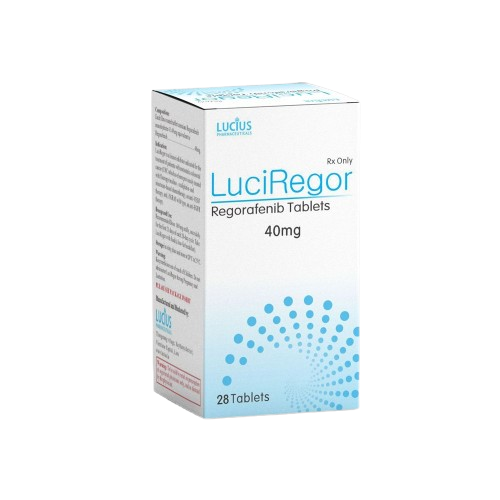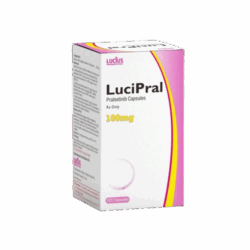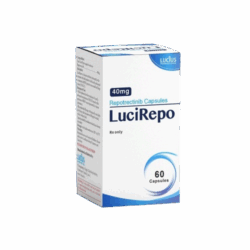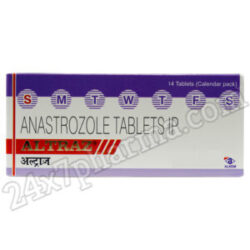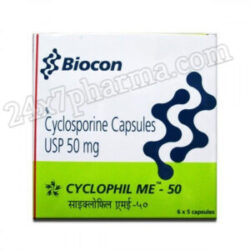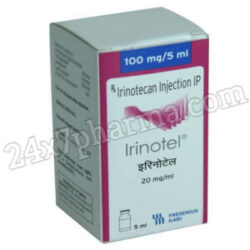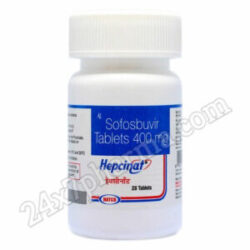LuciRegor 40mg, Regorafenib Tablets
LuciRegor 40mg is a branded formulation of Regorafenib, an oral multi-kinase inhibitor used in oncology. Manufactured in tablet form, it plays a pivotal role in treating certain types of cancers that have not responded well to previous lines of therapy. As a targeted therapy, LuciRegor interferes with cancer cell growth and tumor angiogenesis (blood supply to tumors), thus prolonging survival in patients with advanced malignancies.
What is LuciRegor 40mg (Regorafenib)?
LuciRegor 40mg contains Regorafenib, a synthetic, orally administered inhibitor of multiple protein kinases. It is primarily used in the treatment of metastatic colorectal cancer (mCRC), gastrointestinal stromal tumors (GIST), and hepatocellular carcinoma (HCC) that have progressed despite standard treatments.
This medication falls under the category of tyrosine kinase inhibitors (TKIs), working on different signaling pathways involved in tumor growth and metastasis.
How it Works / Mechanism of Action
Regorafenib exerts its effects by inhibiting a wide array of kinases that are involved in:
- Tumor angiogenesis (e.g., VEGFR1, VEGFR2, VEGFR3, TIE2)
- Tumor proliferation (e.g., KIT, RET, RAF-1, BRAF, mutant BRAF)
- Tumor microenvironment modulation (e.g., PDGFR, FGFR)
- By blocking these kinases, LuciRegor interrupts the blood supply to tumors, inhibits the growth and spread of cancer cells, and affects tumor cell signaling pathways. This multi-target approach makes it effective even in cases where tumors have become resistant to other therapies.
How to Use / Indications
LuciRegor 40mg is approved for use in the following clinical settings:
- Patients with a history of fluoropyrimidine-, oxaliplatin-, and irinotecan-based chemotherapy, anti-VEGF therapy, and anti-EGFR therapy (if RAS wild-type) may have metastatic colorectal cancer (mCRC).
- Adults with gastrointestinal stromal tumors (GIST) who have received prior imatinib and sunitinib treatment.
- Hepatocellular Carcinoma (HCC): In individuals who have received sorafenib treatment in the past.
- The drug is not a first-line treatment but is used when other standard therapies have failed.
How to Take / Dosage
Usual Adult Dose for Colorectal Cancer, GIST, and HCC:
- Recommended dose: 160 mg (four 40mg tablets) once daily
- Schedule: Take for 21 consecutive days followed by a 7-day break (28-day cycle)
- Administration: Take after a low-fat meal, at the same time each day, with a glass of water.
Important Instructions:
- Swallow tablets whole; do not crush or chew.
- If a dose is missed, skip it if the next dose is due soon.
- Dose modifications may be necessary depending on side effects.
Other Dosage and Adjustments
Dose adjustments may be required in the following scenarios:
- Use with caution if you have significant liver impairment; it is not advised.
- Adverse reactions: In case of severe hand-foot skin reactions, liver toxicity, or hypertension, the dose may be reduced to 120 mg or even 80 mg per day.
- Elderly or patients with low performance status: May require closer monitoring.
Side Effects
Common Side Effects:
- Fatigue
- Loss of appetite
- Diarrhea
- Weight loss
- Skin reaction of the hands and feet (pain, edema, and redness on the palms and soles)
- Voice changes (hoarseness)
- High blood pressure
- Mouth sores
Serious Side Effects:
- Liver damage (elevated liver enzymes, jaundice)
- Severe bleeding
- Gastrointestinal perforation
- Myocardial infarction (rare)
- Severe skin reactions
To treat side effects and keep an eye on liver function, routine blood tests are required. Report any unusual symptoms immediately.
Storage
- Temperature: Store at 20°C to 25°C (68°F to 77°F)
- Keep in original container to protect from moisture
- Keep out of reach of children
- Do not use expired tablets or those with changed appearance
Benefits
- Survival advantage: Increases overall survival in patients with advanced cancers when other therapies fail.
- Oral administration: Convenient compared to IV chemotherapy.
- Multitargeted approach: Simultaneously attacks tumor growth, angiogenesis, and tumor microenvironment.
- Delays disease progression: Offers disease control even in resistant cases.
- Standard of care: Approved by regulatory agencies (like FDA and EMA) for hard-to-treat cancers.
Prescription
LuciRegor is a prescription-only medication, and treatment must be initiated and supervised by a qualified oncologist. Dosage, duration, and monitoring are individualized based on patient-specific factors.
Interactions
Drug Interactions to Watch For:
- CYP3A4 inducers (e.g., rifampin, phenytoin): May reduce efficacy
- CYP3A4 inhibitors (e.g., ketoconazole): May increase toxicity
- Warfarin and other anticoagulants: May increase bleeding risk
- Painkillers (NSAIDs): Risk of gastrointestinal bleeding
- Herbal supplements: Especially St. John’s Wort, should be avoided
Always inform the healthcare provider about all medications, including OTC drugs and supplements.
FAQs
Can LuciRegor cure cancer?
No, it helps manage and control cancer but is not a cure.
How long can I take LuciRegor?
As long as it’s effective and tolerable; your oncologist will decide.
Is LuciRegor affordable?
It may be expensive; discuss generic options or assistance programs.
Conclusion
LuciRegor 40mg (Regorafenib) is a critical treatment option for patients with advanced colorectal cancer, GIST, and liver cancer who have exhausted other treatments. Its multitargeted approach to blocking cancer growth, angiogenesis, and tumor microenvironment gives it an edge over many other therapies. Despite its potential side effects, proper monitoring and dose adjustments allow many patients to benefit significantly. It represents a promising therapy in the fight against drug-resistant and progressive cancers, offering both hope and extended survival.
Always consult a qualified oncologist for personalized medical advice before starting or modifying treatment with LuciRegor.

